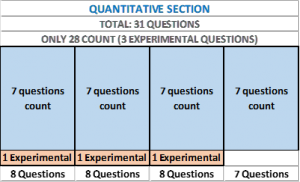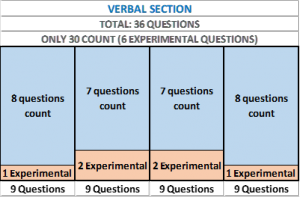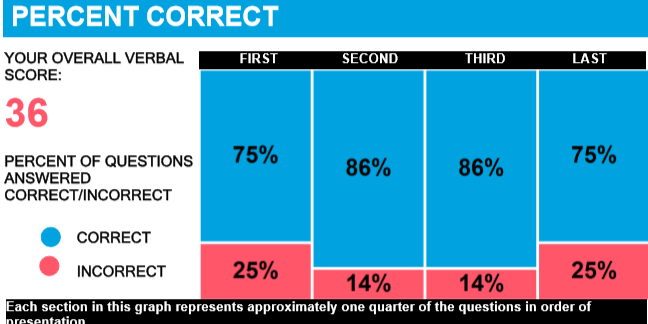You should know by now that the GMAT exam is shorter: you have 62 minutes to answer 31 Quantitative questions, (it used to be 37 questions in 75 minutes), and 65 minutes to answer 36 Verbal questions (it used to be 41 questions in 75 minutes). What does all this mean? Is the exam more difficult or easier? We believe that the exam became a bit more challenging.
After analyzing six Enhanced Score Reports with the Math Dudes, we found out that there are only 3 experimental questions in the Quantitative section, so only 28 questions count toward your score (the same number as before the change). The experimental questions are distributed as follows:

Regarding the Verbal section of the exam, we found out that there are only 6 experimental questions, so only 30 questions count toward your score (again, the same number as before the change). The experimental questions are distributed as follows:

So what do these changes mean? Since the number of questions that count have remained the same, the changes should not affect your overall score significantly. The difference is that most of what you answer in the new exam will count toward your final score. Remember that there were 11 experimental questions in the Verbal section before the change, while there were 9 experimental ones in the Math part. If you take the exam now, you just need to be more careful.
Some of our students have been taking the new version of the exam and scored the same in Quant but a bit lower in Verbal. Most felt that Sentence Correction was more difficult than usual, and we could see in their Enhanced Score reports that most actually scored lower in that section. However, we sent a teacher to take the exam, and he did not notice any difference in the content or difficulty of the questions, what leads us to believe that the lower scores may be psychological. This could happen because there are fewer experimental questions, and you can actually feel how the exam gets more and more difficult the better you do. In the past, you had 11 experimental questions in Verbal (now there are 6), so many of them could have been easy or intermediate questions, making the student feel a sort of “relief” every 7 or 8 questions. To sum up, just take it easy and enjoy the exam. Have fun with it and don’t panic. Have the “I don’t care what happens” attitude and you’ll do better. Good luck in your preparation!






